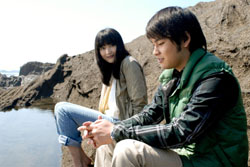MARK SCHILLINGMost commercial films in Japan, as elsewhere, fall into clearly marked boxes, from genre (horror, romcom) to story (zero-to-hero, teen love/tragic death). Indie films here also follow familiar thematic patterns, with miscommunication and alienation being favorites.
"Subete wa Umi ni Naru" ("All to the Sea"), the first feature by TV director and novelist Akane Yamada, centers on an insecure woman looking for love in the wrong places and a sensitive teenage boy with a troubled home and school life. These character types are about as common in Japanese indie films as vengeful female ghosts in Japanese horror films. In other words, shells meet sea shore.
The film, however, is set in the world of books and the bookish. It even lists a "book editor" in the credits — that is, a fellow who selected the volumes that appear in the film as not only objects, but discussion points. This was a first for me, and I've seen some weird credits over the years, beginning with the bird, fly and spider wranglers in "Psycho."


















With your current subscription plan you can comment on stories. However, before writing your first comment, please create a display name in the Profile section of your subscriber account page.